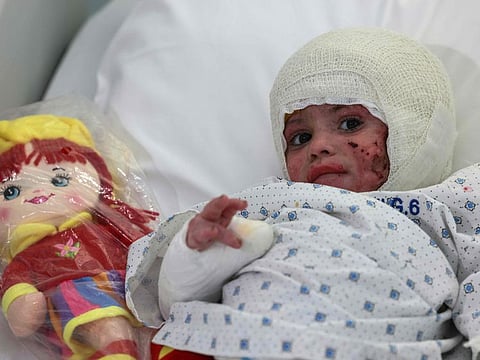Diplomacy in top gear to secure truce in region
Mediators pushing for short-term ceasefire in Lebanon and Gaza to de-escalate tensions

Dubai: International mediators have stepped up diplomatic efforts to push hard for a ceasefire on both fronts to de-escalate tensions in the region.
US, Israeli, Qatari and Egyptian officials have discussed proposing to the warring parties a “short-term” truce of “less than a month,” an exchange of Israeli hostages for Palestinians held in Israeli prisons, and an increase in aid to Gaza.
A Hamas official said that the group would discuss any proposals that include an Israeli withdrawal.
"We have not officially received any comprehensive proposal. We are prepared to engage with any ideas or proposals presented to us, provided they ultimately lead to an end to the war and a withdrawal by the army from the (Gaza) Strip," the official told AFP.
The official, who preferred to remain anonymous, added that Israeli Prime Minister Benjamin Netanyahu is obstructing truce efforts to push an agenda of "genocide, ethnic cleansing and displacement" made possible by the absence of US pressure.
"We have told the mediators that Hamas is ready if (Israel) agrees to a proposal for a ceasefire, complete withdrawal from the Gaza Strip, return of displaced people to their homes in Gaza including the north, entry of sufficient aid for our people and a serious prisoner exchange deal," he said, referring to ceasefire conditions Hamas has repeatedly brought to negotiations.
In Riyadh, Saudi Arabia is hosting the first meeting of a new “international alliance,” with nearly 90 states and international organisations participating to press for the establishment of a Palestinian state.
“A genocide is happening with the goal of evicting the Palestinian people from their land, which Saudi Arabia rejects,” Saudi Foreign Minister Prince Faisal bin Farhan said, describing the humanitarian situation as “catastrophic” and denouncing the “complete blockade” of northern Gaza.
The Riyadh meeting was expected to focus on humanitarian access, the embattled UN agency for Palestinian refugees and measures to advance a two-state solution, diplomats said.
US-led deal
On the Lebanese front, Israel is considering a US-led deal to end the conflict and move Hezbollah fighters away from the Israeli border.
The White House is sending two of President Joe Biden’s most senior Middle East envoys, Brett McGurk and Amos Hochstein, to Israel on Thursday as part of the talks.
The plan, if agreed upon, would lead to a 60-day suspension of hostilities while mediators craft a lasting peace deal to remove Hezbollah from the border area and bolster the number of United Nations peacekeepers there, according to Israel’s Channel 12 TV.
Meanwhile, Hezbollah’s new leader, Naim Qassem, said the group would agree to a ceasefire with Israel under acceptable terms but added that a viable deal has yet to be presented.
“If the Israelis decide that they want to stop the aggression, we say we accept, but under the conditions that we see as appropriate and suitable,” he said.
Qassem insisted Hezbollah would not “beg for a ceasefire”, however, and warned that it had not yet received a credible proposition.
Meanwhile, in a sign of political machinations behind the scenes of the devastating military conflict, Israeli Energy Minister Eli Cohen said the country’s security cabinet was meeting to discuss what terms it might offer to secure a truce.
“There are discussions, I think it will still take time,” Cohen told Israeli public radio.
According to Israel’s Channel 12 television, Prime Minister Benjamin Netanyahu held talks with ministers on Tuesday evening on Israel’s demands in return for a 60-day truce.
Sign up for the Daily Briefing
Get the latest news and updates straight to your inbox



